These are some of the things that come up in Hong Kong movies or in discussion about them.
Related Links:
![]()
These are some of the things that come up in Hong Kong movies or in discussion about them.
Related Links:
4 - Regarded as an unlucky number in Hong Kong.
8 - Regarded as a lucky number in Hong Kong (the Cantonese translates to "wealth").
999 - The Hong Kong equivalent of the US's 911 (an emergency number).
1997 - The year Hong Kong and related territories (a British colony) was handed back over to Chinese control after the British "won" the port after years of fighting, staring in the 1840's with the Opium War (see below). For more information about the handover, check out the Nando Times news archive.
2047 - The year the Chinese government will formally take control of Hong Kong.
ABC - Acronym for American Born Chinese, a person who was born in America but moves over to Asia.
ABT - Acronym for the John Woo movie A Better Tomorrow, which kicked off the gangster movie craze in Hong Kong upon its release in 1986.
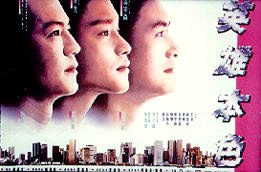
ACC - Acronym for the magazine Asian Cult Cinema, One of the few (at least here in the US) English-language magazines that covers Hong Kong movies. It's an okay mag, but I don't think it's really worth the $6 price tag. There's also way too much coverage of Japanese sex films; at times it comes off looking like a glorified porno mag. Created and edited by Tom Weisser (pictured below right).


action director - Also known as an action co-ordinator, stunt director or 2nd unit director; the person in charge of the action sequences in films. Depending on the director, the action director may actually take control over the set during the filming of the sequence. Good action directors (such as Sammo Hung) often become very powerful in Hong Kong film-making, moving on to producing and/or directing.
ah - A Cantonese word used to designate a friend; a "casualizing" of a proper personal name. For instance, Chow Yun-Fat might be called "Ah Yun" by his friends and relatives.
ah can - A Cantonese nickname (loosely translated to "country bumpkin") for Mainlanders who have moved to Hong Kong. Used to describe certain moives such as Ninth Happiness, where the main conflicts come from the clash between city (Hong Kong) and country (China) values.
alt.asian-movies - A Usenet newsgroup (message board) for the discussion of (you guessed it) Asian movies.
Arena Video - A video company known for putting fake titles (usually with "gangsta" slang) on and hastily (and badly) editing movies so they can sell them as different films. For example, after Jet Li became popular in the US after his appearance in Lethal Weapon 4, they renamed Li's Kung Fu Cult Master to Lord of the Wu Tang. Also has a subsidiary called Xenon.
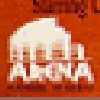
artifacting - Sometimes referred to as pixellation, this problem is found on many VCDs and cheap DVDs as poor compression methods (ways to get the movie onto the disc) result in the colors in the frame becoming "blocky," such as in the top right corner of the frame below.
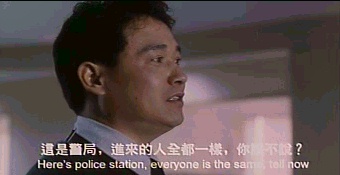
astronaut - Someone whose family has moved abroad (usually to Canada or Austrailia) to obtain passports/citizenship, but themselves stays in (or commutes to) Hong Kong, usually for monetary reasons.
auditorium version - A bootleg version of a movie that was shot with a camcorder in the theatre, usually during a premiere screening.
banana - An Asian person that tries to "act white" by adopting Western mannerisms or dress (yellow on the outside, white on the inside) -- Aunt Yee (Rosamund Kwan) in the Once Upon a Time in China series is often the recipient of this insult; also a slang term for penis.
Big Brother - The leader of a gang/crime "family."
bluescreen - A type of special effect that allows actors/objects to be placed on top of previously filmed images. Often used in Western (and to a smaller extent in Hong Kong) movies for dangerous stunts. Newer movies use a slightly different process known as greenscreen.
Boxer Rebellion - Also known as the Boxer Uprising, this was a Chinese nationalist uprising against foreigners, the representatives of alien powers, and Chinese Christians in 1900. Expulsion of all foreigners from China was the ultimate objective of the uprising.
In 1899, a secret society of Chinese called the Yihequan ("Righteous and Harmonious Fists"), known by Westerners as the Boxers, began a campaign of terror against Christian missionaries in the northeastern provinces. Although the Boxers were officially denounced, they were secretly supported by many of the royal court, including the Dowager Empress Cixi (Tz'u-hsi). Economic and political exploitation of China by various Western powers and Japan and humiliating military defeats inflicted by Great Britain in the Opium Wars (1839-1842, 1856-1860) and by Japan in the First Sino-Japanese War (1894-1895) were the main causes of Chinese resentment, compounded by general economic problems. The terrorist activities of the Boxer society gradually increased during 1899 with Boxer bands attacking Christians on sight. When these bands entered the Chinese capital, Beijing, the foreign powers dispatched a small relief column from Tianjin (Tientsin) to secure their interests and citizens in the capital. On June 13 Cixi ordered imperial troops to turn back this column, and the ensuing crisis culminated on June 18, 1900, in a general uprising in Beijing, with Cixi ordering that all foreigners be killed. Many foreigners and others took refuge in the part of the city where the foreign legations were located; the area was placed under siege by the rebels. A larger relief expedition consisting of British, French, Japanese, Russian, German, and American troops relieved the besieged quarter and occupied Beijing on August 14, 1900. The relief forces retained possession of the city, looking for and punishing anti foreign actions, until a peace treaty was signed on September 7, 1901.
By the terms of the treaty the Chinese were required to pay, over a period of 40 years, a large indemnity. Other treaty provisions included commercial concessions and the right to station foreign troops to guard the legations in Beijing and to maintain a clear corridor from Beijing to the coast. Despite efforts by the United States to stop further territorial encroachment, Russia extended its sphere of influence in Manchuria during the revolt, a policy which culminated in the Russo-Japanese war (1904-1905).Some governments, notably Great Britain and the United States, tried to mitigate the indemnity payments by using them to finance scholarships for Chinese students. In 1924, the United States Senate remitted all further payments. In China the defeat further discredited the ruling Qing (Manchu) dynasty and accelerated political developments toward revolution. Dramatized in such movies as Once Upon a Time in China.
(Information reprinted for academic purposes only from the Microsoft Encarta Encyclopedia, (c) 1998 Microsoft)
brother - Used to denominate a good friend, and also in Triad society to signify someone of the same "rank."
buddy - Term for a Triad member; usually used to signify someone in the same gang.
bun - Another name for a dumpling (various meats cooked in dough); popular fast food in Hong Kong, though people become wary of the treat after movies such as The Untold Story featured killers who tried to hide the evidence by cooking human meat into buns.
Cantonese - The Chinese dialect of Hong Kong. Sometimes used to describe traditional Chinese culture and values.
Cantopop/Cantorock - Term for Cantonese (Hong Kong) pop and rock songs. Many Hong Kong actors (such as Leslie Cheung, Alan Tam and Jacky Cheung) got their start performing this kind of music.
casualty - A hospital emergency room.
Category or CAT - The Hong Kong rating system. Hong Kong has a film classification system under which films are classified into one of the following categories:
Category I - represented with a circle - suitable for all ages (similar to US "G"/"PG")
Category IIA - represented with a square - not suitable for children (similar to US "PG-13")
Category IIB - represented with a square - not suitable for young persons and children (similar to US "R")
Category III - represented with a triangle - for persons aged 18 or above only (similar to US "NC-17")


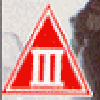
[There is also another unofficial rating -- Category IV or "sai chai" -- which is used by pirate dealers to designate hardcore pornography.]
While Categories I, IIA and IIB are advisory in nature, the age restriction (18 or above) for Category III films is strictly enforced. Apart from films, packagings of Category III videotapes and laserdiscs and advertising materials of Category III films must be approved by the Film Censorship Authority (FCA) before they can be published or publicly displayed.
The Film Censorship Ordinance (the Ordinance) was enacted in 1988. Since then, a three-tier film classification system has been adopted. The Ordinance was amended in November 1995 to provide, among other things, a finer classification by dividing Category II into two sub-categories, namely Category IIA and Category IIB. This is intended to give more information to movie-goers, particularly parents, in the selection of films for themselves or their children.
Films intended for public exhibition have to be submitted to the Commissioner for Television and Entertainment Licensing, who is the FCA under the Ordinance, for approval. Films approved for public exhibition are then either classified or exempted from classification. As one of the measures to improve the operation of the Ordinance and make the regulatory regime as user and business friendly as possible, the Ordinance was amended on 17 June 1999 to exempt non-commercial still films (including slides), of a cultural, educational, instructional, promotional or religious nature from the classification requirement.
In 2000, 1,068 films were approved for public exhibition. Of these, 196 (18%) were classified as Category I, 223 (21%) as Category IIA, 420 (39%) as Category IIB and 229 (22%) as Category III. The film classification standards are kept in line with community standards by regular surveys on community views and consultation with a statutory panel of advisers comprising 252 members drawn from a wide cross-section of the community. A survey conducted between April and May 2000 indicated that there is general community support and acceptance of the existing film classification system and the existing film classification standards are generally in line with the expectations of the community.
The Ordinance also requires that packagings of Category III videotapes and laserdiscs and advertising materials of Category III films must be submitted to the FCA for approval before publication or public display. Advertising materials of films which have not been given a classification or have a classification other than Category III may also be submitted for approval on a voluntary basis.
The decision of the FCA can be reviewed by the Board of Review (Film Censorship) which is a statutory body established under the Ordinance. It comprises nine non-official members and the Secretary for Information Technology and Broadcasting as an ex-officio member.
(Information reprinted for academic purposes only from Hong Kong Government)
cattie - An ancient Chinese measure of weight, approximately 0.6 kilograms or 1.3 pounds.
CCTV - Acronym for Chinese Central Television, China's official (government-controlled) network.
center framing - A cheap form of TV screen formatting that simply chops off the edges of the original movie frame and blows up the center portion. This differs from pan-and-scan (see below) in that no effort is made to capture all the action of the scene, and annoying/funny results can happen such as hearing someone talking, but not being able to see them. Hong Kong film fans also hate this format as it results in incomplete subtitles.
Central - The area in Hong Kong that holds many of the top businesses and banks.
CGI - Acronym for computer generated imagery. Often used to create things on film that would be too dangerous or totally unable to produce live (wild animals, explosions, monsters, etc.). Widely used in Hollywood, some of the bigger-budgeted Hong Kong films have started to use this technology (one of the best examples is The Storm Riders). When the effects are used in martial arts movies, the result is sometimes called computer-fu.
chicken - Slang for prostitute; sometimes chick is also used.
Chinese New Year - This is a two-week celebration that starts with the first full moon of the year. The most prestigious Chinese and Hong Kong movies usually come out during this period.
Chinese opera - Unlike western opera, Chinese opera is a combination of singing, acting, dancing, acrobatics and martial arts. The plays are usually based on folk tales, fables, or historical events. Many notable martial arts stars, such as Jackie Chan and Sammo Hung, received their training in Chinese opera.
chopper - A large knife/machete; popular weapon for Hong Kong hooligans since guns are illegal.

chuppie - A Hong Kong yuppie (young urban professional).
CID - Acronym for the Central Intellegence Division, the arm of the law that covers high-profile crimes such as drug trafficking and murder; dramatized in many movies such as Hard-Boiled and just about every film Danny Lee has been in.
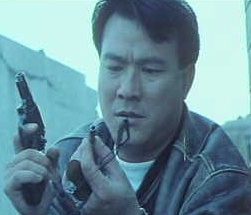
congee - A thin rice porridge, sometimes flavored with seafood.
coolie - A low-paid laborer; sometimes used as a derogatory term.
counting game - A popular Hong Kong drinking game; as with most drinking games, the rules are kind of sketchy, but it seems similar to the US game "bullsh*t."
CYF - Acronym for Chow Yun-Fat, one of Asia's most popular actors.
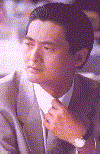
dai lo - Loosely translated, big (as in powerful or high-up) man. Sometimes used to sarcastically describe someone.
dim sum - A restaurant where the food is brought around on carts for the patrons to choose from.
Dragon Boat Festival - A 2,000 year-old festival that is held on the fifth day of the fifth lunar month. It is one of Hong Kong's most popular events. The Festival commemorates the death of a popular Chinese national hero Qu Yuan, who drowned himself in the Mi Lo River during the third century B.C., in protest against a corrupt government. Probably the most recognizable use of the festival in a movie is the assassination sequence from The Killer.
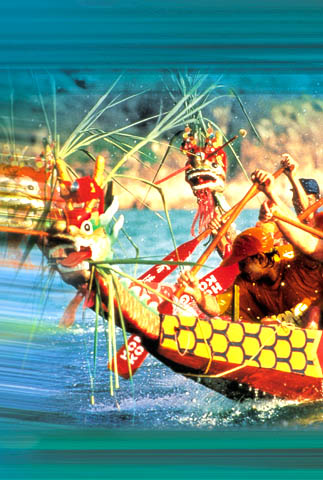
dubtitiling - A process in which a subtitled version of a movie follows the dubbing "script", which often leads to inaccurate translations. This has been occurring more with the growing number of major DVD releases of HK movies by US companies (Gen-X Cops, Gorgeous).
empty hands - Combat without weapons.
EU - Acronym for Emergency Unit; the arm of the police that assists other cops in taking statements and other routine duties. Similar to what people in the US might term "beat cops." Dramatized in the Benny Chan movie Big Bullet.
face - Asian term for respect ("to give face" is to give someone respect or treat them honorably).
fellow - Term for a Triad member, usually one of low rank; a thug.
feng shui - A belief where one believes that one obtains power/protection/good luck from the certain placement of a house/building and the things in it.
flying paper - Refers to the fairly common practice in Hong Kong film-making of making up scripts as the filming goes along; probably the most well-known practitioner of this is Wong Jing.
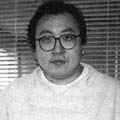
Four Heavenly Kings of Cantopop - Four popular singers/actors -- Aaron Kwok, Jacky Cheung, Leon Lai and Andy Lau (pictured from left to right below). The term was invented by TVB during 1991/92 when the quartet's individual singing careers took off. Their popularity lasted for a long period until the last 2 years or so when it suddenly plummeted -- because of this, the term is rarely heard now.
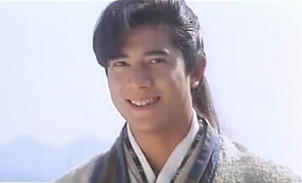
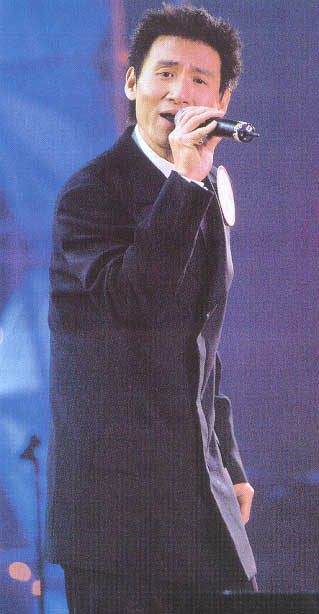
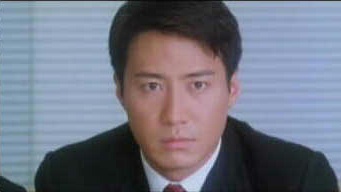
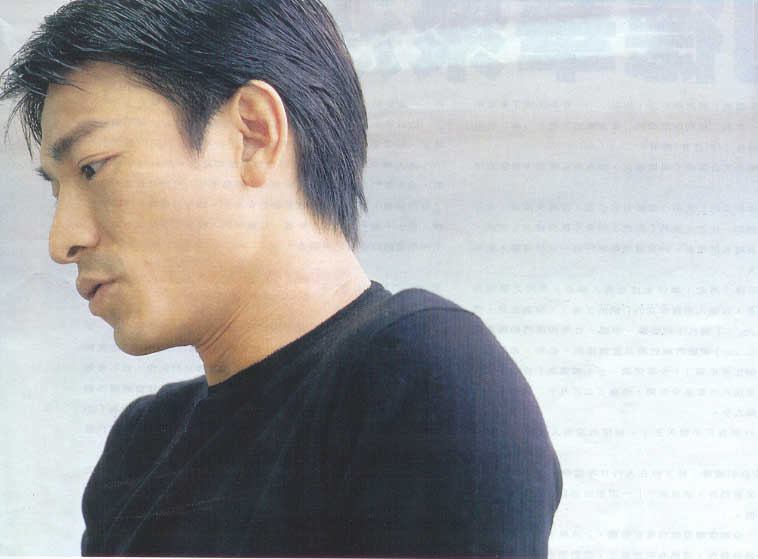
With the new group of stars popping up, there is now a group known as the Four Young Kings of Cantopop. They are (pictured left to right): Nicholas "Nic" Tse, Leo Koo, Daniel Chan and Stephen Fung.
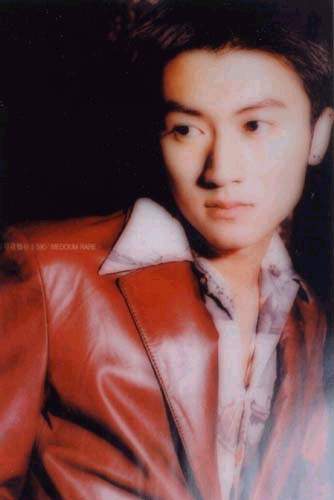
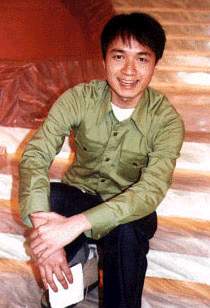

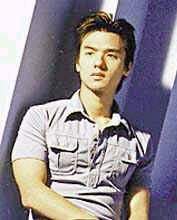
Fukien - A Chinese province well-known for its' criminal activity.
gag - An action sequence which concentrates on a particular prop or gimmick (i.e., Jackie Chan's "ladder fight" in Police Story 4: First Strike).
girls-with-guns - An offshoot of the heroic bloodshed (see below) genre featuring female characters.
gor - Cantonese for big brother (see above); also used with a name to designate respect or friendship (e.g., Chow Yun-Fat might be referred to as "Fat Gor").
gray market - Stores or websites that sell things not usually available, like director's cuts or uncut versions of films by circumventing copyright laws. Usually their videos are overpriced and have bad quality.
gun-fu - Exaggerated, acrobatic, extremely choreographed gunfighting (e.g., John Woo).
gun running - Guns are illegal in Hong Kong, so many criminals run guns to get money.
golden slots - The prime movie premiere dates; late summer, Christmas, and Lunar New Year.
GoG - Acronym for the movie God of Gamblers.
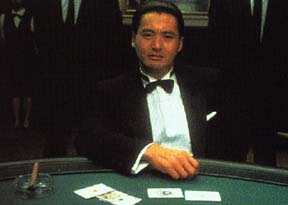
Golden Triangle - An area in Asia encompassing parts of Vietnam, Cambodia and Thailand that supplies most of the world's opium.
gweilo or gwailo - Literally, "Ghost Man" or "white devil"; a term for a white westerner (sometimes used derogatively). Used to describe a non-Asian fighter in a martial arts film, such as Richard Norton or Cynthia Rothrock.
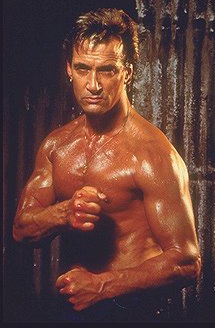
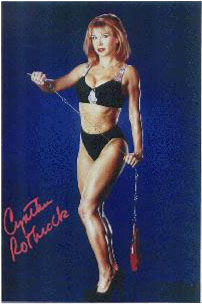
heng dai - Term used to describe the relationship between brothers (both through blood and crime).
heroic bloodshed - A somewhat generic term first used by UK fanzine editor Rick Baker given to films (usually in the crime genre) that feature an emphasis on the relationships between cop/criminal, father/son, brother/brother, etc. There is also usually a high level of violence in the form of high-powered gun fights and/or beatdowns. Some well-known directors of this genre include John Woo, Ringo Lam and Kirk Wong.
HK - Acronym for Hong Kong.
HKer - Someone from Hong Kong.
HKFA - Acronym for the Hong Kong Film Awards, HK's equivalent of the Oscars.
HKIFF - Acronym for the Hong Kong International Film Festival, a prestigious event held yearly.
HKJC - Acronym for the Hong Kong Jockey Club, the organization in charge of regulating horse racing in HK. Racing is a popular sport in HK, with over US$10 billion bet yearly on races, which places it just behind America and Japan.
HKMDB - Acronym for the Hong Kong Movie Database, the largest internet site for Hong Kong movies. Found at http://www.hkmdb.com.
HKSAR - Acronym for Hong Kong Special Autonomous Region (see below); in discussion about films, this refers to ones made after the 1997 handover to China.
Hung Hom - A district in Kowloon (see below) known for its low property values and high Triad activity.
honey lips - Sweet talk; usually used derogatively ("Save your honey lips for someone that cares").
Hongkie - Someone from Hong Kong.
Hong Kong's golden age - Refers to the period between 1986 (after the release of A Better Tomorrow) and 1993 (when Jurassic Park became the top-grossing film), when Hong Kong film production was at an all-time high.
Hong Kong new wave - Term used for the films made by the first "wave" of filmmakers (such as Tsui Hark) who were either trained in or drew their influence from the West. It has since been re-used to designate more "modern" films (like those of Wong Kar-Wai) that explore characterization while using slick camera techniques.
hostess club - A bar where men pay to drink with good-looking women (hostesses); often the transactions will lead to sexual encounters. Basically a glorified brothel, though there are some legitimate clubs where sexual contact is not allowed.
ice - Slang for illegal drugs.
ICQ - A way to chat over the internet; sometimes used by pirates to exchange movies.
idol - An extremely popular actor (usually with teenagers). Many times, they are pop stars as well. A couple of examples are Ekin Cheng and Andy Lau.
idol machine - The system for creating big stars by giving new actors singing contracts (or vice versa), putting them on magazine covers, getting them on talk shows, etc. Sometimes referred by the Cantonese phrase ge ying shi ("music, film, TV").
IMDB - Acronym for the Internet Movie Database, one of the biggest film sites on the web, found at http://www.imdb.com. Unfortunately, their entries for Hong Kong movies/stars are often inaccurate.
jade screen - Films produced in Asia, specifically China, Hong Kong or Japan (similar to the term "silver screen" for Hollywood films).
jai - Cantonese for "little brother." Used by Triads to describe someone lower in rank who you still respect.
jianghu - An enclosed world with its own professional ethical code. Used to describe Triad society.
jing -Using cleverness to get ahead in the world. Used to describe someone who thinks with their head instead of their heart. Usually villains in HK movies are personifications of jing.
joi gin - Cantonese for "goodbye"; the pidgin English (see below) term "bye bye" is also often used.
jut jai - Cantonese for "nephew." Used by Triads to designate someone who has just entered their ranks, and also by "normal" older citizens when they are addressing someone younger than themselves.
John Woo-style - A generic term, used to describe high levels of violence, characters who shoot with a gun in each hand, and/or the use of slow motion in action sequences.
Kowloon - An area in Hong Kong known for black-market activity.
kowtow - Bowing down to someone to show respect.
kung fu - A generic term for southern Chinese martial arts styles (aka southern fist or Shaolin style) which emphasize upper-body moves.
Kwan Gung - A Mainland warlord whose valiant battles have turned him into a "saint" for both criminals and cops.
Lan Kwai Fong - A district in Hong Kong whose "trendy" clubs attract mostly young foreigners.
Lantau Island - An outlying area in Hong Kong.
letterbox - A video format that shows the original theatrical ratio; also called widescreen.
Lunar New Year films - Big-budget, all-star romantic comedies/dramas that come out during Chinese New Year.
Mah Jongg - A popular gambling game in China; somewhat similar to poker or dominoes in that you must try to beat the other person's "hand."
mainland - China.
mainlander - Someone who lives in China.
mamasan - The female manager (pimp) of a hostess club.
Manadrin - The dominant Chinese dialect, used over much of China. Sometimes used to describe traditional Chinese culture and values.
Manchu - The rulers of China that were overthrown by revolution in the 1910's. They exercised strict controls over the people, such as forcing them to wear the same hairstyle (a queue -- see below). Some martial-arts films use the Manchus as thinly-veiled symbolism for the Communist rulers of China.
midnight snack - Slang for a late-night sexual encounter, usually involving prostitutes.
Milkyway - A production company known for its' quirky and unconventional crime films such as A Hero Never Dies.
mo lay tau - A Cantonese term for "nonsense comedies" personified by Steven Chow's films, with their fast pace, heavy use of Cantonese slang and toilet humor. The term's literal translation is "nine follows eight, but nine doesn't have anything to do with eight."
Mongkok - An overcrowded district in Kowloon.
mook jung - Cantonese for "dead wood"; used to describe stupid/slow people or bad actors like Michael Wong.
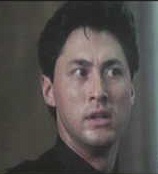
mugoi - Cantonese for "thank you."
nasty foreign chick - A kung fu genre featuring foreign female fighters; popular in the mid to late 1980's after the success of Yes, Madame!
New Territories - The northern area of Hong Kong, added in 1898.
numerology - The belief (held by many Chinese people) in the power of numbers and the relationships between them. Hierarchal placement is important within families, business associates, and Triad gangs, as each has their own system with people becoming more important within the organization as their numbers (which correspond to their "rank") rise. For example, Sandra Ng's "Sister Thirteen" character in the Young and Dangerous series name referes to her rank within her gang.
nutter - An insane person (as in "you're nuts").
OCTB - Acronym of Organized Crime and Triad Bureau, the wing of the HK police force that investigates (suprisingly enough) Triad activity. Dramatized in the movie Organized Crime and Triad Bureau.
old-school - Refers to the more traditional kung-fu films of the '60's and '70's.
Opium War(s) - Conflicts fought between Great Britain and China in which Western powers gained significant commercial privileges and territory.
The Opium Wars began when the Chinese government tried to stop the illegal importation of opium by British merchants. The First Opium War started in 1839 when the Chinese government confiscated opium warehouses in Guangzhou (Canton). Britain responded by sending an expedition of warships to the city in February 1840. The British won a quick victory and the conflict was ended by the Treaty of Nanking (Nanjing) on August 29, 1842. By this treaty, and a supplementary one signed on October 8, 1843, China was forced to pay a large indemnity, open five ports to British trade and residence, and cede Hong Kong to Great Britain. The treaty also gave British citizens in China the right to be tried in British courts. Other Western powers demanded, and were granted, similar privileges.
In October 1856, Guangzhou police boarded the British ship Arrow and charged its crew with smuggling. Eager to gain more trading rights, the British used the incident to launch another offensive, precipitating the Second Opium War. British forces, aided by the French, won another quick military victory in 1857. When the Chinese government refused to ratify the Treaty of Tianjin, which had been signed in 1858, the hostilities resumed. In 1860, after British and French troops had occupied Beijing and burned the Summer Palace, the Chinese agreed to ratify the treaty. The treaty opened additional trading ports, allowed foreign emissaries to reside in Beijing, admitted Christian missionaries into China, and opened travel to the Chinese interior. Later negotiations legalized the importation of opium.
(Information reprinted for academic purposes only from the Microsoft Encarta Encyclopedia, (c) 1998 Microsoft)
PC - Short for police constable; a beat cop.
pidgin English - Poorly spoken/understood English, mostly comprised of common phrases; usually used by immigrants. As Hong Kong was a British territory, many pidgin English phrases (such as "bye bye") have come to be commonplace in the Cantonese vernacular. Sometimes called (for some reason) "pigeon English." Also referred to as chinglish ("Chinese English") or engrish ("English Chinese").
PRC - Acronym for the People's Republic of China, the name of modern Communist China.
PTU - Acronym for Police Tactical Unit, the arm of the police force that handles crisis situations (bank robberies, hostage situations, etc.). The SWAT-type force that actually goes in and handles the dirty work in these situations are known as the Special Duties Unit, or SDU. There have been many movies that deal with these teams, specifically their training tactics, known as police procedural movies, such as First Option.
qing - Chinese term for the emotive feelings generated by one's heart. Used to describe someone who goes with their gut instincts rather than logic and will do anything to help their friends. Most heroes in HK movies are personifications of qing.
Qing Dynasty - The time period when the Manchus ruled China. Sometimes spelled as it is pronounced, "Ching." Not to be confused with qing (see above) in any way.
queue - The hairstyle imposed by Manchu rulers on the people of China during their period of rule; shaved in the front with a long braid in the back. Cutting of the braid was considered dishonorable to the Manchus and could result in death. It was also believed by some that the queue contained the "essence" of a person and so by cutting a part of it, so-called "sorcerers" could take a person's soul and compel them do things.

parallel importing - When multiple companies import the same movie into a country. For instance, World Video sells Jet Li's Kung Fu Cult Master, while Arena Video sells a different version called Lord of the Wu-Tang.
passport prison - A country (such as Canada) where people from Hong Kong reluctantly stay to obtain passports and/or citizenship.
passport widow - Someone who stays in a foreign country to obtain citizenship while one of their family members still works in Hong Kong.
po kai - A Cantonese swear word that loosely translates to "bastard," though it can take other connotations such as "son of a bitch." Sometimes used by itself to express anger.
rascal - Slang for a Triad member.
red pocket/packet - In Chinese culture it is customary to give someone a gift of money enclosed in a red envelope on important occasions (birthdays, weddings, etc.). The term is sometimes used in crime movies to describe payoffs/protection money.
Repulse Bay - An upper-class area on the south side of Hong Kong.
rotter - A "rotten" person; used to describe the villain in some films.
roughie - Term for an ultraviolent movie; usually used to describe movies with sexual violence in them (e.g., rape, S&M).
SAR - Acronym for special autonomous region; what Hong Kong is now termed under Chinese rule since the handover in 1997 whereby the Chinese government agrees to let things run "as they were" for fifty years.
SCMP - The South China Morning Post, a popular newspaper in Hong Kong.
Shaw Bros. - The Shaw Brothers Studio, who were the king of the kung-fu movie during the '60's and '70's. They were notorious for being cheap and signing their stars/directors to long-term contracts.
Shenzen - A Chinese city on the border of Hong Kong; a popular entry point for illegal immigrants and exit for fleeing criminals.
shoe shiner - Someone who "sucks up" to those in power to better themselves; a kiss-up/boot-licker/ass-kisser.
shrimphead - Slang term for a man with a small penis.
sifu - Chinese for "master"; usually used to describe the head of a martial arts school. The Japanese version is referred to as a sensei.
snakehead - Someone who smuggles illegal immigrants to/from Hong Kong.
Stanford database - This was one of the first major internet sites dedicated to Hong Kong movies; it was a searchable database ala the IMDB. It was taken down after Stanford decided the resources needed to be "used for other academic purposes."
squib - Term for a special effect which produces the effect of a bullet hit by electrically shocking a small packet of fake blood.
sync sound - Using the on-set sound in the final film; this technique was rarely used in HK until a few years ago.

tape trading - Exchanging copied/bootlegged videotapes for other tapes.
The Two Tonys - Tony Leung Ka-Fai (pictured below left) and Tony Leung Chiu-Wai, two of Hong Kong's most popular actors.
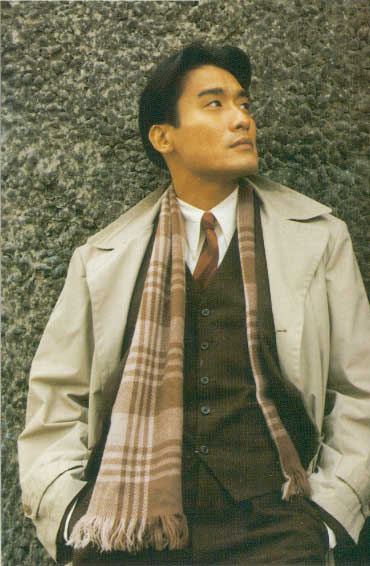
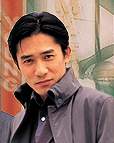
Three Brothers - Films starring Sammo Hung, Jackie Chan and Yuen Biao, such as Wheels on Meals and Dragons Forever. The term comes from the fact that they were all "brothers" (classmates) at the same opera school.
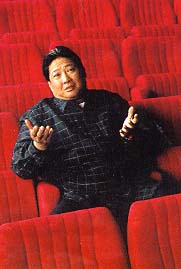
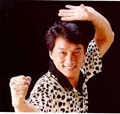
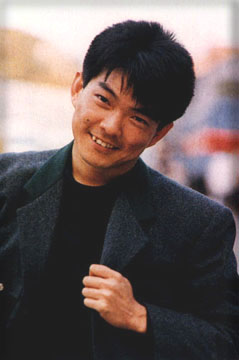
Tianeamen Square Massacre - Refers to the student protests that took place in China in 1989 that ended up in a riot, with the army killing some of the students. Some films (such as Bullet in the Head) make allegoric/symbolic references to this event.
Tolo Harbour - The most polluted body of water in Hong Kong.
Triad - The name for Hong Kong's organized crime families. Originally they started as somewhat honorable revolutionaries in the early 1900's, but found that gun running could make them a lot of money and turned to crime after the revolution.
Triad Boyz - An offshoot of the heroic bloodshed genre started in the mid-1990's that focuses on young Triad members, usually making the Triads seem cool and hip; exemplified by the Young and Dangerous series. Also known as young rascals or goo wat jai movies.
true crime - A genre of films (such as The Untold Story) that are -- sometimes loosely -- based on real events/crimes. Usually they are packed with explicit sex and/or violence.
TST - Short for Tsim Shat Sui; an area in Hong Kong known for dishonest shopkeepers; the eastern area (TSTE, or Tsim Shat Sui East) is famous for its clubs, which attract both cops and Triads.
turtle's egg - A derogatory term, as in someone is "lower than a turtle's egg" (turtle eggs are buried in the ground and left by their mother before they hatch).
TVB - The television arm of the Shaw Bros. studio, where many prestigious Hong Kong film actors and directors got their start.
UFO - Acronym for United Filmmakers Organization, a production company known for quality films with the youth as its target audience. The films were very contemporary in nature and delved into the relationships of today's youth/yuppies in HK. The films tend to be very glossy, sleek and sophisticated with a very heavy Western influence. Some of their well-known films include Days of Being Dumb, Comrades: Almost a Love Story and He's a Woman, She's a Man.
uncle/aunt - In Chinese society, it is common to use "uncle" or "aunt" as a term of endearment/respect for those older than you (similar to how Westerners use "mister" or "sir"); used by Triads to give respect to those higher up in rank. "Aunt" is also used to designate the madam of a brothel.
undercranking - A method used during the filming of fight scenes where more frames are shot per second as to make the actors' movements appear faster.
VCD - Acronym for Video CD. The most popular form of home video in Asia, mostly due to its low cost. Easily copied, it is a favorite medium for bootleggers, who often release copies of films currently playing in cinemas. For more information, please consult my VCD FAQ.
VSOM - Acronym for Video Search of Miami. They supposedly offer hard-to-find titles at reasonable prices, but when you look at them carefully all they really offer is 3rd or 4th generation dubs at $25 or more. In my opinion, VSOM is little more than a glorified pirating organization that tries to curtail copyright laws by portraying themselves as a "club." Run by the same guy who publishes ACC.
wah - A Cantonese word used for surprise or a call for attention to something (i.e., "Wah! That girl is really pretty!").
wei - A Cantonese word used to answer the telephone or to get someone's attention (i.e, "Wei! You dropped your wallet!")
White Lotus Sect - Also known as the White Lotus Society, this was a group of revolutionaries dedicated to getting rid of foreign influennce in China during the Boxer Rebellion (see above). Many of them believed they had supernatural powers and thus were invincible to even bullets. There was a similar group known as the Red Lantern Sect, which was comprised of females. Both groups were featured in the Once Upon a Time in China movies.
white-on-white subtitles - Subtitles in Hong Kong movies are often not given very high importance, so they are just simply printed onto the frame (sometimes this process' result is called burnt on subtitles). Since the subtitles are white, they can bleed into light background colors and be hard to read. Note the picture below: the subtitles over the man's dark-colored shirt are easy to read, but the ones over the light-colored wall are hard to read. Since most home copies of Hong Kong movies simply use the film source print, this is a problem with many videocassettes, VCDs and cheap DVDs.

wu shu - Generic name for mainland (northern) Chinese martial arts (translates roughly to "crafts of combat") which emphasize lower-body moves (aka Northern Fist); practiced by, among others, Jet Li.
Wu-Tang Clan - A clan of fighting Buddhist monks portrayed in a series of movies. Made popular by the rap group of the same name.
wuxia - Term for the hero in a swordplay movie.
wuxia pian - Term for the "swordplay" genre, personified by films such as the Swordsman trilogy (pictured below). They are often based on ancient tales and feature high-flying kung fu sequences.
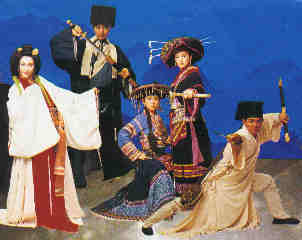
X.O. - A high-class cognac; since it is aged for a long time, it is sometimes used to call somebody old ("you're too X.O. to change now.").
Y&D - Abbreviation for the popular film series Young and Dangerous.
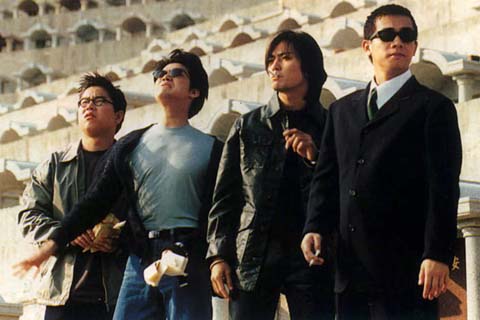
ya qui - Term for the code of brotherhood demonstrated in many HK crime dramas.
Yakuza - Japanese crime families similar to the American Mafia. They often sport colorful tattoos and have the tradition of cutting fingers or committing suicide if they fail in a task.
ying wen - Cantonese for "English language."
Thanks to Hong Kong Obscura, Hong Kong Cinema-View From the Brooklyn Bridge, The Hong Kong Tourist Association Homepage, "The Diablocal Erroneous Monk," "silverfox", Peter Nepstad, Yvonne and "Ol' Battlemonkey" from alt.asian-movies/Mobius and the books "Hong Kong Action Cinema", "Planet Hong Kong" and "City on Fire" for providing some of the info for this section.